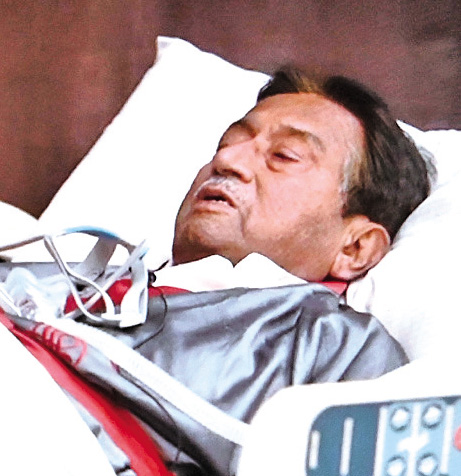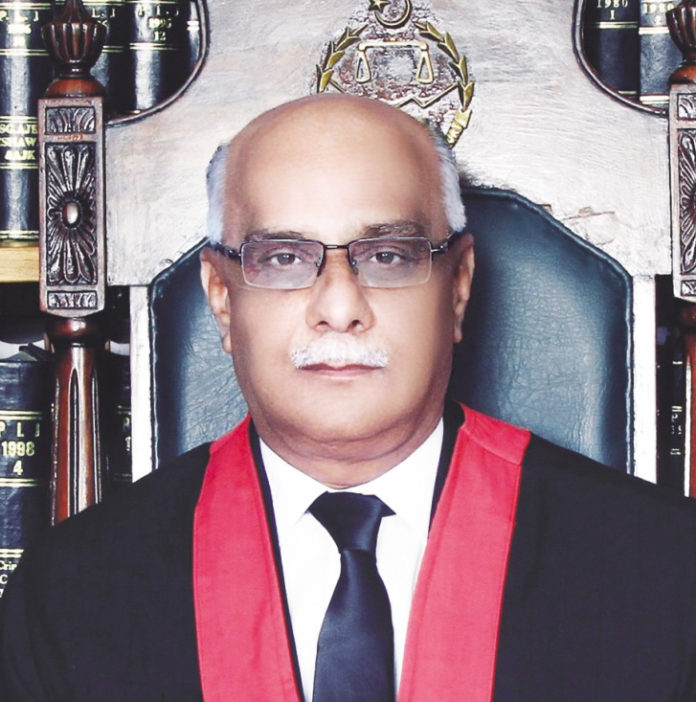A three-member bench of the special court in Islamabad, headed by Peshawar High Court (HC) Chief Justice Waqar Ahmad Seth, trying the ailing 76-year-old former military ruler General Pervez Musharraf, living in Dubai on self-exile, found him guilty of high treason over his imposition of emergency rule in the country in November 2007 and handed him the death sentence under Article 6 of Pakistan’s Constitution.
Article 6 says “any person who abrogates or subverts or suspends or holds in abeyance, or attempts or conspires to abrogate or subvert or suspend or hold in abeyance, the Constitution by use of force or show of force or by any other unconstitutional means shall be guilty of high treason”. The punishment for high treason, according to the High Treason (Punishment) Act, 1973, is death or imprisonment for one’s lifetime.
The 2-1 majority verdict was announced by the bench of Peshawar HC Chief Justice Waqar Ahmad Seth, Justice Nazar Akbar of the Sind HC and Justice Shahid Karim of the Lahore HC. Justice Akbar of the Sind HC had dissented from the verdict.
In its 167-page detailed judgement authored by Justice Seth, who headed the bench, the special court on Thursday said the “convict be hanged by his neck till he dies on each count as per charge.”
Justice Seth wrote that Musharraf should be hanged even if he dies before his execution. “We direct the law enforcement agencies to strive their level best to apprehend the fugitive/convict and to ensure that the punishment is inflicted as per law and if found dead, his corpse be dragged to the D-Chowk, Islamabad, Pakistan and be hanged for 03 days,” he wrote.
Gen Musharraf is the first military ruler of Pakistan to be tried and convicted for overruling the constitution. Three other generals – Ayub Khan, Yahya Khan (who took over from Ayub Khan) and Zia-ul-Haq – had also subverted the constitution and taken power but did not face trial. The military has ruled Pakistan for roughly half of its 72-year existence.


Musharraf, the then army chief, had seized power by ousting then-prime minister Nawaz Sharif in a 1999 bloodless coup. He also served as Pakistan’s president from 2001 to 2008.
Case Against Musharraf
While Musharraf had first imposed a state of emergency in the country in 1999 after toppling the elected government of then prime minister Nawaz Sharif, he was tried for high treason for his actions of November 2007. On November 3, he had imposed emergency for the second time, suspending the Constitution and detaining politicians and judges of the superior courts. By mid-December, he ended the state of emergency after introducing legislation to protect some of the actions he had taken during that time.
He also imprisoned several judges and issued provisional constitutional orders to safeguard his dictatorship. Nawaz Sharif initiated the move in 2013 to file a case of high treason against Musharraf over his declaration of extra-constitutional emergency. He was booked in the treason case in December 2013. In March 2014, he was indicted during his appearance in the court. He had pleaded not guilty. He was convicted in 2014, but time and again, the military leadership intervened to have the case quashed. When this did not happen, former army chief Raheel Sharif intervened to ensure that Musharraf left the country so that his trial could be stymied.
Musharraf went to Dubai in 2016 for medical treatment, promising to return to Pakistan within a few weeks. A few months later, the special court declared him a “proclaimed offender” and ordered the confiscation of his properties. Later, his passport and ID card were cancelled on the orders of the top court.
During the course of the case, the special court was reformed six times. The special court had reserved its judgment in November 2019, saying that it would announce the verdict on November 28.
Meanwhile, the incumbent Pakistan Tehreek-i-Insaf (PTI) government had come to Musharraf’s rescue and filed a petition in the Islamabad HC seeking deferment of the announcement of the verdict. On November 27, the Islamabad HC had stopped the special court from issuing its verdict and directed the government to constitute a new prosecution team.
When the special court reconvened on November 28, it had noted that it was not bound to follow the Islamabad HC’s orders but allowed the former military dictator one more chance to record his statement in the case by December 5. On December 5, the special court had announced that it would issue the verdict on December 17 even if both sides had not completed their arguments.
Musharraf’s Challenge
Musharraf challenged the Islamabad special court’s verdict and sentence in the Lahore HC. The petition challenged paragraph 66 of the special court’s verdict, which read, “We direct law enforcement agencies to ensure that… his corpse be dragged to the D-Chowk, Islamabad and be hanged for three days”.
The 86 page-long petition highlighted that the “judgement contained a mix of anomalies and contradictory statements”. It added that the special court “rapidly and hurriedly wrapped up the trial which was far from conclusion”, the report said.
The petition stated that the special court “has not taken into consideration that no actions detrimental to national interest were taken by the applicant” as “no offence of high treason is made out from the evidence presented against him (Musharraf) before the special court”.
Pak Army’s Reaction
The sentence somewhat unnerved the military establishment as its authority was challenged in six-and-a-half decades.
Pakistan’s powerful army said on the same day that its former chief Gen (retd) Pervez Musharraf could “never be a traitor” and a special court verdict against him in the high treason case has been received with “lot of pain and anguish by rank and file of Pakistan Armed Forces,” Inter-Services Public Relations, the Pakistan army’s media arm, said in a statement.
“An ex-Army Chief, Chairman Joint Chief of Staff Committee and President of Pakistan, who has served the country for over 40 years, fought wars for the defense of the country can surely never be a traitor,” Army spokesman Maj Gen Asif Ghafoor said in a brief statement.
“The due legal process seems to have been ignored including constitution of special court, denial of fundamental right of self defence, undertaking individual specific proceedings and concluding the case in haste,” he said.
“Armed Forces of Pakistan expect that justice will be dispensed in line with Constitution of Islamic Republic of Pakistan,” Ghafoor said.
The Judiciary-Military Tangle
The death sentence given to former military ruler in a treason case was unprecedented in Pakistan, where the army has ruled for almost half of the country’s history and continues to play an outsized role. The verdict clearly embarrassed and angered the military. While opposing the sentence, the military said Musharraf can never be a traitor.
Musharraf had once famously remarked that Pakistan’s Constitution was just a piece of paper to be thrown in the dustbin. This cavalier attitude had characterised his years as both army chief and then Pakistan’s ruler, from the decision to send troops to occupy strategic heights in the Kargil sector, which led to a conflict with India, or his move to take on the judiciary in 2007, which ultimately led to his downfall.
Pakistan’s judiciary has had a complicated and complex relationship with both the military and the civilian government, sometimes adopting an unnecessary role as a power arbitrator. The death sentence will have far-reaching ramifications, and could trigger uncertainty, as Pakistan’s different power centres seek to assert themselves. It remains to be seen whether the verdict will send out a message that the generals can no longer interfere in politics and grab power, or whether the military, which in recent years, has begun shaping electoral outcomes to suit its needs instead of assuming power directly, will ensure it remains the dominant force. But it, nonetheless, represents a significant moment in the country’s complex polity.
Musharraf had suspended constitution in 2007 and imposed extra-constitutional emergency. This was a time when the top judges of the Supreme Court of Pakistan were imprisoned and over hundred judges were sacked. In these dark times, voice of democracy lay muted. Also, the one with prime role and responsibility in the Kargil war against India, Musharraf remained at the helm of affairs in Pakistan till 2008, before he resigned in fear of impeachment backed by the Pakistan People’s Party government and fled the state. It was in 2013 when the tabels turned against Musharraf with Nawaz Sharif of the Pakistan Muslim League-Nawaz (PML-N) returning to power after 14 years. That year, Musharraf had emerged from his self-exile to participate in the general election but stood disqualified by the judiciary. Subsequenly, the Nawaz Sharif government filed a case of treason against Musharraf which case reached its logical conclusion in a special court on 17 December.
Musharraf’s case also represents a measure of tensions between the civilian government and the judiciary as the PTI government was attempting judicial moves to stop the special court from announcing the verdict.
How the military will deal with the pain and anguish caused by the judgment and how it will ensure its continued dominance remains to be seen.
Ironical Role Reversal
It was indeed an ironical instance of role reversal in a duel between Pervez Musharraf and Nawaz Sharif for supremacy in Pakistan, in 1999, when Pervez Musharraf had ousted Nawaz Sharif, he had the dismissed prime minister stand trial on many accounts including treason, arguing that Nawaz Sharif had tried to delay landing of Pervez Musharraf’s plane on his return from Colombo on the day of the 1999 military coup. Eventually Nawaz Sharif reached an agreement with Pervez Musharraf and the trial for treason was to be dropped and Sharif’s family was allowed to go into exile in Saudi Arabia.
In the Nawaz Sharif government of 2013, as expected, Musharraf stood the trial for treason which took off but lost steam after Pervez Musharraf fled once again to Dubai in 2016 after the Nawaz Sharif government removed his name from the no-fly list.
In October 2019, the Imran Khan government made an entry in 2018 and sacked the entire legal team employed by the Nawaz Sharif government but it could not delay the verdict in the case for more than a month.
It is unlikely that Pervez Musharraf would be extradited to Pakistan for execution of the death sentence given his connections in the Emirates. An interesting point of coincidence is that when Nawaz Sharif was sentenced to a 10-year jail term in a corruption case in 2017 and was forced to quit, he, too, has been in exile in London receiving medical treatment for ailments.
A vindicated Nawaz Sharif may have had the last laugh in this power struggle of two decades, but considering matters at large in Pakistan, the judiciary, in this verdict against Musharraf has also paved the way for an occasion to redefine civil-military relations in the state.
The historicity of the fact is that this is the first time in Pakistan’s history of seven decades that a military chief has been found guilty of treason and awarded the death sentence, taking critical attention to the complex institutional power dynamics in which the military has exercised a tight upper hand. The Pakistan judiciary’s stand is also one in the face of the interest of the establishment.

















